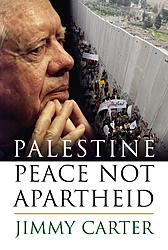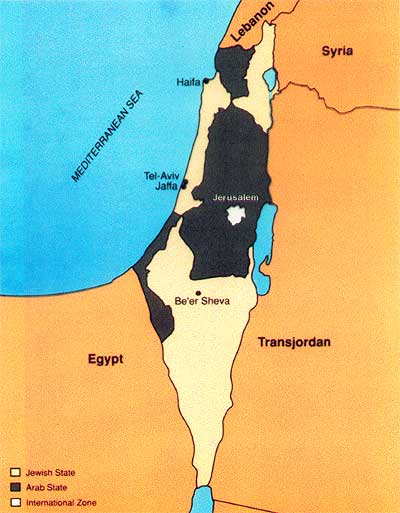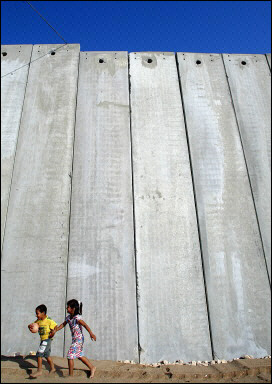 A year and a half ago, when I first visited Washington D.C. as an activist and not a tourist, I was a little worried, uncomfortable, and put off when the organization I was about to join, the Campus Antiwar Network, turned their chants from the illegal occupation of the nation of Iraq into “Free, free Palestine! Long live the Intifada!” I had never before read anything or studied anything about the Palestine/Israel conflict, and all I knew that I had Jewish friends and a Jewish aunt, and they were all nice people, and there was a lot stuff happening on both sides I didn’t understand. For that protest in January 2007 and for many months afterward, I respectfully maintained a silence during that particular chant, as I was unwilling mentally commit myself to supporting the Palestine cause as many of my fellow activists did.
A year and a half ago, when I first visited Washington D.C. as an activist and not a tourist, I was a little worried, uncomfortable, and put off when the organization I was about to join, the Campus Antiwar Network, turned their chants from the illegal occupation of the nation of Iraq into “Free, free Palestine! Long live the Intifada!” I had never before read anything or studied anything about the Palestine/Israel conflict, and all I knew that I had Jewish friends and a Jewish aunt, and they were all nice people, and there was a lot stuff happening on both sides I didn’t understand. For that protest in January 2007 and for many months afterward, I respectfully maintained a silence during that particular chant, as I was unwilling mentally commit myself to supporting the Palestine cause as many of my fellow activists did.
However, a year and a half with activists in meetings, discussions, and watching some rather disturbing films with eyewitness testimony have resulted in a sick feeling of revolting similarity between the illegal occupation of Iraq and the illegal occupation of Palestine. I just finished reading Palestine Peace Not Apartheid, the controversial treatise by former president Jimmy Carter, and found my concerns about Israel’s insane foreign policy justified. I wish that I had read the book when it originally came out in late 2006 instead of over a year later, but I’m ashamed that I had no inkling or interest in activism at that point.
I found Carter’s frankness and colloquial writing style very engaging, and was able to read the ~250 page book within a couple of days. Carter’s description of his earliest engagements with Israel as a man who was “infatuated with the Holy Land” having taught Bible lessons for 20 years and visiting in 1973 before becoming president, viewing the “Palestinian problem” with a sideline concern provides details of his perspective’s metamorphosis. This is a man who has arguably spent more time in the occupied areas of Palestine than the vast majority of Israeli citizens and therefore would be considered by an objective audience to be a very qualified, non-biased reviewer of the situation.
Carter provides some background of Israel’s and Palestine’s background early on, and then proceeds to briefly describe neighboring Arab countries in their relation with the newborn state of Israel and the occupied land of Palestine. The rest of the book, for the most part, is neatly and orderly laid out from 1973 into early 2006. Carter unabashedly and unapologetically plays the mediator throughout the book, although his critics have gone so far as to call him “anti-Semitic” (check out some of the reviews of the book on Amazon.com at the bottom of this article). Carter describes his meetings with Palestinian and Israeli leaders over the decades to be at varying level of productivity, but he is blunt in his opinion that although promises are made by both sides, Israel has continuously
- refused to honor the United Nations’ request that Israel withdraw to its originally defined borders (from 1949),
- provide compensation and Right of Return to displaced Palestinians,
- remove the walls around the West Bank/Gaza that have already been proclaimed by an overwhelming majority of the International Court of Justice to be in violation of the Geneva Conventions (and therefore, International Law (such as it is, more on that later))
and other importance grievances the Palestinians have against the Israelis.
 However, Carter continuously in numerous chapters and in no uncertain terms stresses that all Arab countries must recognize Israel as nation, allow it to exist peacefully, and that terrorist attacks on Israeli citizens are of course, not conducive nor acceptable to an ongoing peace process. He describes his friendship with several Israeli leaders (and conversely, the chilling dialogue between religious leader and prime minister Menachem Begin when Carter at times practically beseeches the conservative Israeli leader to consider following International Law and allow Palestinians basic human rights) and his continuing optimism that the “cycle of violence” between militant Israelis and militant Palestinians and their just-as-militant allies Hezbollah, etc.
However, Carter continuously in numerous chapters and in no uncertain terms stresses that all Arab countries must recognize Israel as nation, allow it to exist peacefully, and that terrorist attacks on Israeli citizens are of course, not conducive nor acceptable to an ongoing peace process. He describes his friendship with several Israeli leaders (and conversely, the chilling dialogue between religious leader and prime minister Menachem Begin when Carter at times practically beseeches the conservative Israeli leader to consider following International Law and allow Palestinians basic human rights) and his continuing optimism that the “cycle of violence” between militant Israelis and militant Palestinians and their just-as-militant allies Hezbollah, etc.
The book concludes by stressing that massive majorities of both Israelis and Palestinians (and the rest of the International community) favor two-state solutions and seek peace and compromise. Carter criticizes American leadership for continuing to put straight and direct peace talks on the back burner, and points out that throughout the conflict, America has said one thing and done another in the region – the USA has demanded that Israel retreat to its 1949 borders, but yet continues to use its might to block UN resolutions openly critical of Israel’s policies, provide massive military and economic support to Israel regardless of Israel’s activities.
When [George H.W. Bush] finally threatened to withhold a portion of the $10 million daily aid package, plus loan guarantees, from the United States, the Israeli government complied [with H.W. Bush’s requests of settlement freezes in Palestinian terrority] and the grants and loans were approved […] Later, after President Bush was no longer in office, I noticed that this major settlement was being rapidly completed.
page 132
I took this as a striking example of the USA’s power in further negotiations between the conflicting groups. Israel’s dependence on American aid and support, at least back in the early 1990’s, was enough that it has been one of the very few things to forestall further illegal development of Palestinian-owned territory. I strongly agree with Carter’s assessment that the USA will be required to participate in these negotiations (which he dryly noted had not occurred for approximately six years) and I feel that whichever president happens to be in power must have the willpower to withstand the massive lobbying power of Jewish organizations such as AIPAC to prevent blatant bias in negotiations against the beleaguered Palestinians. I understand that the power of Muslim lobbying groups in America is not even in the same league as Jewish groups and therefore politicians feel they must tread a thin line to protect their precious voting blocs.
Carter notes the difference in public perception outside of the Middle East towards the conflict. Europe, for example, takes a much more hard line on the daily human rights violations:
Americans were surprised and angered by an opinion poll, published by the International Herald Tribune in October 2003, of 7,500 citizens in fifteen European nations, indicating that Israel was considered to be the top threat to world peace, ahead of North Korea, Iran, or Afghanistan.
page 209, link to source and bold emphasis added by me
I like to imagine that America was surprised and angered by this opinion poll because it appeared as a National Weather Service-esque banner during the middle of Fear Factor or Dancing With The Stars. “I was recording that, those jerks!” America said, indignantly and collectively, as it reached for its Value Meal.
Another quote that really stuck with me as I closed the book was early on, when Carter mentioned allegations that Israel was purposely confiscating foreign aid money being sent to Palestine by the International community on the grounds that it could be used “to sponsor terrorism.”
[Palestinians] claimed that the government had seized U.S. Agency for International Development funds intended for a center for retarded children in Gaza and that Jordanian and other Arab money intended for education and the development of a poultry industry in some of the poorer communities in the West Bank was being withheld.
page 122
Israeli governmental figures did not comment on that particular incident (at least, not that Carter mentions to us) but denied that money sent to Palestine was being used to build Israeli homes in Palestinian territory (that would just be sickeningly ironic). However, they were forthright and practically proud that the Israeli military kept lists of “troublemakers” and made sure that family members or friends who had goods to sell would have their marketable produce destroyed or “held” until it spoiled and became useless. It should be noted that Israel does not allow Palestinians to sell any products within Israel which could possibly provide any competition for Israeli vendors. (Carter notes in later chapters that some regions in Palestine were so restricted economically that Israel prevented them from producing their own goods, literally forcing them to purchase from Israeli suppliers.)
 Although I am not a lawyer (I merely hold a degree in Legal Studies), I know that I now join a multitude of legal-minded individuals throughout the world in expressing disappointment with and condemnation of Israel’s policies. Between September 2000 and March 2006, over three and a half times as many Palestinians were killed in the conflagration, and in that number, almost seven times as many Palestinian children were killed versus Israeli children (These stats can be found on page 206). I abhor assigning numeric valuations on human life, especially that of children, but in the face of proportions like that, the Israeli argument that Palestinian militants are targeting their civilians seems like the pot calling the kettle black (or the assault tank calling the stone a deadly weapon).
Although I am not a lawyer (I merely hold a degree in Legal Studies), I know that I now join a multitude of legal-minded individuals throughout the world in expressing disappointment with and condemnation of Israel’s policies. Between September 2000 and March 2006, over three and a half times as many Palestinians were killed in the conflagration, and in that number, almost seven times as many Palestinian children were killed versus Israeli children (These stats can be found on page 206). I abhor assigning numeric valuations on human life, especially that of children, but in the face of proportions like that, the Israeli argument that Palestinian militants are targeting their civilians seems like the pot calling the kettle black (or the assault tank calling the stone a deadly weapon).
However, my education in Legal Studies taught me one primary lesson: International Law is essentially useless when any number of parties decline it, and as I read this, my readings and lectures quickly became applicable. United Nations requests, International meetings, proclamations, and all of the political meanderings become useless in the face of a nation that refuses to play by everyone else’s rules. When the most powerful nation in the United Nations and in the UN Security Council continuously refuses to speak against atrocities, not much can be accomplished on that front either. At least in H.W. Bush’s case, it took actual threats of economic sanctions to curtail the bulldozing of Palestinian homes and construction of Israeli settlements – and that only lasted until Clinton took over. I believe Carter may be placing too much hopeful optimism in repeated polite requests from the International community towards changing Israeli policies.
Palestine Peace Not Apartheid was an excellent, down-to-earth, and descriptive read of the conflict between the Palestinians and Israelis, from the perspective of Jimmy Carter, arguably the best-informed American on the entire situation, and indeed probably more knowledgeable than most residents of the region. I found the half-dozen maps of Israeli/Palestinian borders throughout the book also helpful in increasing understanding (including the Israeli invasion of the Egyptian Sinai several decades ago). It is definitely a book worth reading if, like me, you’ve been interested in the subject and wanted to see it through the eyes of a respected and influential international figure. Check it out!
OTHER: If you use Google Earth, take a look at this user-created .KMZ file which contains records of hundreds of settlements which Palestinians claim have been destroyed or repopulated by Israel since its foundation. Although of course I can’t vouch for its accuracy (and Google sure is being very careful to point out that it has nothing to with this sort of thing) it’s pretty eye-opening and definitely a worthwhile addition to your collection of Google Earth overlays.
“Everyone has to move, run and grab as many hilltops as they can to enlarge the settlements because everything we take now will stay ours…Everything we don’t grab will go to them.”
–Israeli Foreign Minister Ariel Sharon, 1996
page 147


A Nice Falsetinian ProPALganda Shiite. Sorry to tell you that the author of the article relates his view point according to misleading and false facts and ignore history correctness, law values and dignity.
Abe,
I encourage you to post facts and information from credible sources. I doubt that they can top Carter’s experience. But saying that I “ignore law values” when Israel has consistently ignored UN mandates and directives to continue a policy of brutal occupation doesn’t make sense.